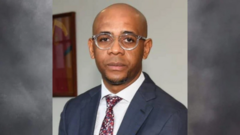As dozens of explicit videos surface, experts suggest that the scandal involving Baltasar Ebang Engonga is a calculated political move amid the fight for succession in the isolated nation of Equatorial Guinea.
Political Maneuvering Behind Equatorial Guinea's Sex Tape Scandal

Political Maneuvering Behind Equatorial Guinea's Sex Tape Scandal
The recent leak of explicit videos involving a senior civil servant may be more than just a scandal; it could signal the ongoing power struggles within Equatorial Guinea’s political elite.
The article text:
What the global audience perceives as a sensational sex tape scandal might, in fact, be part of a deeper political intrigue unfolding in Equatorial Guinea. In the last two weeks, an estimated 150 to over 400 explicit videos have emerged, showcasing Baltasar Ebang Engonga, a senior civil servant, engaging in sexual acts with various women. These videos have created a media firestorm, attracting both shock and intrigue in the small Central African nation and far beyond.
Many of the women featured in the clips are reported to be wives and relatives of high-ranking officials, some of whom may have been aware that they were being filmed. Engonga, known by the moniker "Bello" due to his striking appearance, is a nephew of the long-time president, Teodoro Obiang Nguema, who has maintained his position since 1979. Despite the nation’s vast oil wealth, the populace of approximately 1.7 million endures poverty while a privileged elite thrives.
Equatorial Guinea’s political landscape is notorious for its human rights violations, including reports of torture and extrajudicial killings. The government has also witnessed a series of scandals, such as the luxury possessions of relatives of the president, with very few genuine opposition voices allowed because dissenters are routinely silenced or forced into exile.
Engonga was arrested on 25 October under allegations of theft, accused of embezzling substantial state funds and hiding them in offshore accounts. He has yet to publicly respond to these charges. Following his arrest, the explicit videos began circulating online. The first mention on social media appeared around 28 October, drawing considerable attention to the unfolding situation.
The leaked videos originated from Telegram, eventually spreading across mobile devices and WhatsApp groups, triggering a public uproar. Identifying features within the videos have led to recognition of Engonga along with some women who are connected to the regime.
In response to the chaos, Vice-President Teodoro Obiang Mangue ordered telecom companies to devise methods to curb the dissemination of these intimate clips, emphasizing the need to protect families from the fallout. Meanwhile, the police have urged women featured in the videos to step forward against Engonga for allegedly distributing intimate images without consent.
Activists suggest that the leaks serve a dual purpose beyond mere embarrassment; they may represent an internal threat to Obiang Mangue's ambition to consolidate power as the future president. Some believe Engonga's ties within the political elite could pose a challenge to the vice-president's succession plans.
Equatorial Guinea’s complex political environment makes it ripe for covert power struggles shrouded in scandal, and the situation surrounding Engonga has attracted speculation of motivated leaks designed to eliminate rivals. As the regime grapples with the fallout, activists express concern that this scandal might serve as a pretext for authorities to further stifle dissent in an already tight media landscape.
The ultimate impact of the scandal remains uncertain as efforts continue to restrict the spread of the videos. Despite attempts to manage the narrative, interest in Equatorial Guinea has surged online, with significant spikes in search queries linked to the nation's name. Noting the profound implications of this situation, some activists emphasize that the sordid details are symptomatic of systemic issues far more severe than the tawdry scandal itself.
What the global audience perceives as a sensational sex tape scandal might, in fact, be part of a deeper political intrigue unfolding in Equatorial Guinea. In the last two weeks, an estimated 150 to over 400 explicit videos have emerged, showcasing Baltasar Ebang Engonga, a senior civil servant, engaging in sexual acts with various women. These videos have created a media firestorm, attracting both shock and intrigue in the small Central African nation and far beyond.
Many of the women featured in the clips are reported to be wives and relatives of high-ranking officials, some of whom may have been aware that they were being filmed. Engonga, known by the moniker "Bello" due to his striking appearance, is a nephew of the long-time president, Teodoro Obiang Nguema, who has maintained his position since 1979. Despite the nation’s vast oil wealth, the populace of approximately 1.7 million endures poverty while a privileged elite thrives.
Equatorial Guinea’s political landscape is notorious for its human rights violations, including reports of torture and extrajudicial killings. The government has also witnessed a series of scandals, such as the luxury possessions of relatives of the president, with very few genuine opposition voices allowed because dissenters are routinely silenced or forced into exile.
Engonga was arrested on 25 October under allegations of theft, accused of embezzling substantial state funds and hiding them in offshore accounts. He has yet to publicly respond to these charges. Following his arrest, the explicit videos began circulating online. The first mention on social media appeared around 28 October, drawing considerable attention to the unfolding situation.
The leaked videos originated from Telegram, eventually spreading across mobile devices and WhatsApp groups, triggering a public uproar. Identifying features within the videos have led to recognition of Engonga along with some women who are connected to the regime.
In response to the chaos, Vice-President Teodoro Obiang Mangue ordered telecom companies to devise methods to curb the dissemination of these intimate clips, emphasizing the need to protect families from the fallout. Meanwhile, the police have urged women featured in the videos to step forward against Engonga for allegedly distributing intimate images without consent.
Activists suggest that the leaks serve a dual purpose beyond mere embarrassment; they may represent an internal threat to Obiang Mangue's ambition to consolidate power as the future president. Some believe Engonga's ties within the political elite could pose a challenge to the vice-president's succession plans.
Equatorial Guinea’s complex political environment makes it ripe for covert power struggles shrouded in scandal, and the situation surrounding Engonga has attracted speculation of motivated leaks designed to eliminate rivals. As the regime grapples with the fallout, activists express concern that this scandal might serve as a pretext for authorities to further stifle dissent in an already tight media landscape.
The ultimate impact of the scandal remains uncertain as efforts continue to restrict the spread of the videos. Despite attempts to manage the narrative, interest in Equatorial Guinea has surged online, with significant spikes in search queries linked to the nation's name. Noting the profound implications of this situation, some activists emphasize that the sordid details are symptomatic of systemic issues far more severe than the tawdry scandal itself.



















